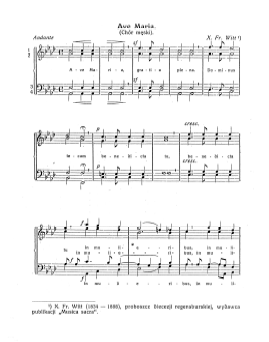Ave Maria SATB
Composer: Rev. Franz Xaver Witt (1834-1888), s.a.

 |
 |
 |
X |
X |
|
(?) |
|
Witt |
|
|
|
|
|
|
|
Sancta Maria |
SATB |
a
cappella |
|
X |
X |
X |
X |
X |
|
Franz Xaver |
|
Witt |
|
1834 |
1888 |
|
|
|
|
Ave Maria |
V (2) |
org |
 |
 |
 |
 |
 |
|
Franz Xaver |
|
Witt |
|
1834 |
1888 |
|
|
|
|
Ave Maria |
Coro |
|
|
X |
X |
X |
X |
X |
|
Franz Xaver |
|
Witt |
|
1834 |
1888 |
|
|
|
|
Ave Maria
|
Coro maschile
|
|
|
X |
X |
X |
X |
X |
|
Franz Xaver |
|
Witt |
|
1834 |
1888 |
|
|
|
|
Ave Maria
|
V |
org |
|
X |
X |
X |
 |
 |
|
Franz Xaver |
|
Witt |
|
1834 |
1888 |
|
|
|
|
Missa Sancta Maria |
SATB |
a
cappella |
 |
 |
 |
X |
X |
|
(?)
|
|
Witt +
Ludwig
Bonvin |
|
1850 |
1939 |
|
1914 |
|
|
Ave Maria by Witt,
arr. by Ludwig Bonvin |
solo voice |
|
 |
 |
 |
X |
X |
|
Frz.
|
|
Witt +
Ludwig
Bonvin |
|
1850 |
1939 |
|
|
|
|
Ave Maria by Frz. Witt,
arr. by Ludwig Bonvin |
2vv |
organ |
|
X |
X |
X |
X |
X |
|
Christian Friedrich |
|
Witt |
|
1770 |
1836 |
|
|
|
Op. 15 |
Ave Maria
|
SATB |
organ ad lib
|
 |
 |
 |
 |
 |
|
Christian Friedrich |
|
Witt |
|
1770 |
1836 |
|
1904 |
|
|
Ave Maria |
SATB |
organ ad lib
|

| Recording: not available |
|
| Lyrics: |
|
A ve Ma ri a, gra ti a ple na.
Do mi nus te cum be ne dic ta tu,
be ne dic cta tu in mu li e _ ri bus,
in mu li e _ ri bus
et be ne di ctus fru ctus
ven tris tu-i, Je-_-_-_-_-_-_-_-_-_-_-_-_-sus.
|
San cta Ma ri a, ma ter De-i
o-ra pro no-bis
o-ra pro no bis pec _ ca to ri bus
nunc et in ho ra,
nunc et in ho ra mor tis no strae.
A _ men, a _ _ men.
|
| Score: free download
available on THIS
PAGE after sign-in |
play/stop MIDI:
|
 |


| Internet
references, biography information. |
|
http://en.wikipedia.org/wiki/Franz_Xaver_Witt |
|
Franz Xaver Witt (February 9, 1834
– December 2, 1888) was a Catholic priest, church musician, and composer. He
was a leading figure in the Cecilian movement for the reform of Catholic
church music in the second half of the 19th century.
Witt was born in Walderbach, Bavaria. His father was a school teacher. Witt
was taught piano and singing from a young age.
He studied theology and science at the seminary in Regensburg. He sang in
the seminary's choir,which was under the direction of Joseph Schrems. He was
ordained as a priest in 1856 and taught Gregorian chant at the seminary at
Regensburg. In 1867 was appointed inspector of the seminary of St. Emmeram.
In 1868 Witt founded the Caecilia Society in order to revive the use of
Gregorian chant and polyphony, and to promote the composition of new
liturgical music in an older style in Catholic churches. Pope Pius IX
recognized the society in 1870. He died in Landshut.
|

Please notify us of any
broken/defective links

Page last modified:
March 25, 2013
Return to my homepage:
www.avemariasongs.org

|
![]()